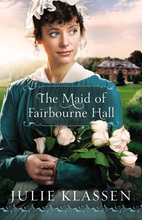 Julie Klassen's The Maid of Fairbourne Hall sends a young woman in fear for her virtue fleeing London as far as she can, seeking a position in service. Margaret Macy has never worked a day in her life, but if it means safety from her stepfather and his lecherous nephew, she will learn. When a local steward hires her as a housemaid, she little expects he is the new steward of Nathaniel Upchurch, a man Margaret scorned for his handsome brother, little good that it did her. Suddenly Margaret is emptying his chamber pots and learning that maybe she misjudged him - and his siblings. But is it safe for her to reveal her true identity to them?
Julie Klassen's The Maid of Fairbourne Hall sends a young woman in fear for her virtue fleeing London as far as she can, seeking a position in service. Margaret Macy has never worked a day in her life, but if it means safety from her stepfather and his lecherous nephew, she will learn. When a local steward hires her as a housemaid, she little expects he is the new steward of Nathaniel Upchurch, a man Margaret scorned for his handsome brother, little good that it did her. Suddenly Margaret is emptying his chamber pots and learning that maybe she misjudged him - and his siblings. But is it safe for her to reveal her true identity to them?While Klassen writes an in-depth Regency-era novel, this one reminds me of the Donkeyskin/Catskin/Rashie Coatie fairy tale - a common story about a princess who flees her father's house, disguises herself as a servant, and hides in the castle of a prince. When he hosts a ball, she cleans herself up and appears in a dress made of starlight, and the prince falls in love, but then she returns to her disguise below stairs. Eventually he seeks her out, rids her of her disguise, and marries her, at which point she reconciles with the family she fled. This novel could be a retelling of the story, though without the magic and with a lot more hard work. Klassen grounds it in reality, taking a girl who knows nothing of work and making her learn, teaching her how to live with and respect those who are "beneath" her.
Though she grew up a vicar's daughter, Margaret is by no means perfect - a trifle spoiled, she is accustomed to a life of gentility, with servants to do all the work for her; as such, she is rather selfish and condescending. When she has to start fending for herself, she discovers how useless she is, with no marketable skills to commend her. I like the changes that come over her while she is in service; she is still impulsive, but she learns to appreciate all the hard work the servants do, she gains better discernment, and she learns self-sacrifice.
There is less of a focus on God in this book than in some of Klassen's others, but there is a good message on not judging people, especially on first impressions. Margaret learns that over and over again - with her former maid, her fellow servants, and the Upchurch siblings. And it proves true, too, with how other characters view Margaret.
This is a clean romance, with a good character building for Margaret and Nathaniel. I appreciated that, at least for the first half of the book, Margaret and Nathaniel have next to no contact with each other, as it should be between a man and the female staff. And when they do start interacting, the reasons make sense. The romance is a bit predictable (as mentioned, it follows the same plot as a number of fairy tale variants), but it did not detract from the story for me. Besides, there are a fair number of enjoyable subplots to spice up the tale and keep it fresh. And if I've read it three times now, it must be good!
Incidentally, it is also the 2012 Christy Awards winner for the Best Historical Romance.
No comments:
Post a Comment